Bleach: Series 3 Part 1
Introduction
I loved season 1 of Bleach, it set up an interesting premise, of spirits and Hollows affecting the real world, and needing Shinigami to deal with them to protect everyday folk. It was a great idea that I expected would hold a lot of storytelling opportunities. Then along came Season 2, altered the character relationships, shifted everything to another realm, and apparently chose to forget all the hard work done in the first season. I hated Season 2 simply because it wasn't season 1. That was stupidity on my part, given that this is a Shonen Jump show, and it's aimed at a certain audience with certain prerequisites. I've read ahead around the show a bit more, and realised what the creators are aiming at. It's certainly not what I was assuming would happen given Season 1. So I've pushed the reset button in my brain, forgotten my disappointment and am ready to take Bleach Season 3 at face value.
You'd think that a teenager's life would be complicated enough if he could speak to ghosts. But that was only the beginning for Ichigo Kurasaki. When he literally bumped into a Shinigami named Rukia Kuchiki, he was introduced to a whole new world. The Shinigami's mission is to guide forlorn spirits known as Wholes to the Soul Society, and protect them and the living from Hollows, perverted spirits that have become monsters that prey on other souls, living or dead. They are not supposed to let the living know about this supernatural world, but not only does Ichigo see Rukia, circumstances force her to give him her powers, and train him to be a Shinigami while she regains her strength. Through their adventures, Ichigo learns that his classmates Orihime and Chad are similarly bestowed with spiritual abilities. He also meets Uryu Ishida, the last Quincy, heir to a tribe of spiritual warriors from the human world that once sought out and destroyed Hollows, before the Shinigami in turn eradicated them for disrupting the balance.
But Rukia's sojourn in the human realm wasn't sanctioned. She broke the rules by giving her powers to Ichigo, she broke the rules by teaching him how to be a Shinigami, and she broke the rules by staying in the human world to support him. Her own brother Byakuya led the team to capture her and take her back to the Soul Society, where she now waits for the death sentence to be carried out. Ichigo wasn't going to stand for this, so guided by the talking cat Yoruichi, he, Orihime, Chad and Uryu set forth, through the gates of the Soul Society into the next world to rescue their friend. Previously, the friends had been split up after entering the Shinigami stronghold of the Seireitei, and were all making their way towards the prison where Rukia was being held. But the various Shinigami squads were alerted to their presence and went on the hunt. Someone among the Shinigami saw this as an opportunity to change the balance of power, and one of the squad captains was murdered, the killing blamed on the interlopers. It turns out that there is a lot more going on in the Soul Society than just the imprisonment of a stray Shinigami. Ichigo was the first to make it to the prison and break Rukia out, but was totally outclassed when confronted by Byakuya. Ganju was injured, Hanataro captured, and Ichigo was only rescued when Yoruichi underwent a remarkable transformation, from male cat to female human warrior, and snatched him out from under Byakuya's nose. The story continues…
Manga Entertainment offer the first 12 episodes of season 3 on three discs.
Picture
Bleach gets a 4:3 transfer that, other than the usual NTSC-PAL conversion issues, is unproblematic. The image is clear enough, the colours strong and vibrant, and the picture is as sharp as you would expect. It's a fun, colourful animation, heavy on the primary colours, and the character and world designs have universal appeal. Given that it is a long running show, you wouldn't expect a great deal of detail and frippery, but though the animation is simple, it's also very dynamic, especially in the action sequences.
Sound
You get a choice of DD 2.0 English or Japanese with a sole translated subtitle track to accompany them. The dialogue is clear, the show has some nice music, and it is all presented as vibrantly and competently as you would expect from stereo soundtracks. I've also noticed that while there is only the single subtitle track, the on screen text continues to be translated, which is an improvement over the first season.
Extras
Disc 1 has a textless closing sequence, along with 20 line-art images in a gallery.
Disc 2 has the closing sequence again, and 18 line-art images in a gallery.
Disc 3 has a new closing sequence, 18 line art images in a gallery again, and trailers for Naruto, Bleach, the Death Note live action movie, and two Bleach console games.
There may be additional goodies in the packaging, but having received the review discs only, I cannot say.
Conclusion
I gave Bleach a clean slate, a fresh start, decided not to hold it's past brilliance against it, and indeed take it at face value. It's probably the most frustrating anime I'm watching right now, and it still makes me swear at my television. So much for the clean slate. You may have noticed a lack of my customary verbose story synopsis at the start of the review concerning the events on these discs. That's because what happens in these discs can be summed up in the space of just a few words. Rukia is still imprisoned in the Seireitei; Ichigo still has to rescue her. At the start of this set of episodes, he learns that he isn't yet strong enough, and he must undergo more training so his Zanpaku-to (sword) reaches Bankai (power-up). At the end of these 12 episodes, he's still training, while Rukia's execution date has been moved up, and she's being led to her imminent demise as the final credits roll. That's not a lot of story to pack into twelve episodes, so it's useful that for the other, innumerable, forgettable characters, stuff happens as well.
I tried my best, really I did. This time, I made sure I invested in the storyline, paid attention to the politicking and machinating that was going on in the upper levels of the Soul Society, made note of where loyalties lay, who liked who, who hated who, how everyone was shaped by their pasts… I embraced every flashback, tried not to roll my eyes at every single diversion that took me away from the main story, but it still didn't work. There are simply far too many characters in Bleach. It's simple enough when you're reading the manga, you can read at your own pace, and there is a handy character guide at the front of the book. The creators have obviously realised this deficiency in the anime, and for the last two episodes of this set, they have instituted little characters guides (heavy on the comedy, light on the info), but it's not enough, and aside from the major characters that have an impact on the main storyline, I'm hard pressed to remember, let alone care about any of the minor Captains, Lieutenants, and cannon fodder of the Soul Society.
It's a tad bizarre really, that I have such a hard time watching Bleach, while I wholeheartedly enjoy Naruto. After all, they are both Shonen Jump properties, long running anime series that work by stretching out storylines to multiple episodes, even multiple series in length. The Chunin Exam arc in Naruto stretched to over two seasons, much longer than the rescue Rukia arc has done so far in Bleach, but I was absent of whinge for that one. Comparisons are indeed apt here, for there is a fundamental difference between the two. Naruto promises much, and delivers. Bleach promises much, and denies. Naruto has a main storyline, bolstered by additional character storylines that add to the interest as those characters are developed and liked. Bleach has a main storyline, which is stretched perilously thin, and the filler that plumps this storyline up lacks narrative nourishment, as the characters are poorly developed and difficult to relate to.
The biggest frustration is the failure to deliver though. Bleach is almost Tantric in its abstinence, constantly taking us to the brink and then pulling back once more. We'll get an action scene, a flashback, a story development or a plot twist, and it will play out just to the good bit, before switching to another character, or another mini story arc, and starting the build up once again. Only very rarely do you get something of substance, and after two or three episodes of build up, it's not much compensation.
There are plot developments and character moments to appreciate in this volume of Bleach though, and I certainly liked the byplay that develops between the new babe version of Yoruichi and Ichigo, as her dry wit is the closest we've gotten to the Rukia Ichigo dynamic of season 1. There are also a couple of fine episodes where Uryu Ishida meets his grandfather's murderer, one of the Shinigami Captains (Squad 12 if you actually care) named Mayuri. He's a despicable character, the Soul Society's Dr Mengele, and it's easy to root for the Quincy in this confrontation. Having introduced the Bankai concept in the first episode, it becomes clear that we'll be seeing a lot more of it on this set, as the various Soul Reapers take their swords to level 2. But we also get to see Uryu go super Quincy on Mayuri's ass, which certainly involves some 'big' animation. These episodes pretty much concentrate on Uryu and Mayuri, and for a moment I thought the episodes of constant diversions and delays were past, but alas these were the exceptions to the rule.
Ichigo's training begins in earnest at this point, and continues on and off for the next eight episodes, offering us a teeny tiny bit of advancement for Ichigo's story every ten minutes or so. It's back to the Captain Aizen murder story at this point. That's the plot development in the previous volume that is throwing the Soul Society into a tizzy. Three of the more truculent Shinigami have been in prison to this point, and they escape for their own reasons. It turns out that Lieutenants Renji, Hinamori and Kira were at Shinigami school together, which is the ideal place for a flashback episode to show their schooling. It turns out, when we get back to the modern day that the conspiracy is more insidious than previously thought. Hinamori is out to avenge her Captain Aizen, and his last letter has apparently given the name of his murderer. Except that name is childhood friend Hitsugaya. Hitsugaya on the other hand wants a piece of Gin Ichimaru, for injuring Hinamori, so a three-way hate-fest is brewing.
It also turns out at this point that Rukia's execution is more than just an execution. The Sokyoku will kill her, and it's a device equivalent to 1 million Zanpaku-to, so the power released could literally reshape the Soul Society. It's obvious that whoever controls the power, controls the Soul Society, and when Hitsugaya realises this, he realises that he has to stop the execution. Then comes a flashback episode I really appreciated. Since Rukia's capture, I've been confused by her utter personality alteration. The abrasive thorn in Ichigo's side, the mischievous sprite has been replaced by a meek, subservient prisoner who accepts her fate, and for nigh on 30 episodes, I couldn't understand why. Finally we get an explanation, and it's a long overdue one. Finally it makes sense, and that's one less nit I have to pick with Bleach.
The nits return in the next episode, as at this point we've already had the announcement that Rukia's execution has been moved up. It's been offset by the flashback episode, and it's offset again as we return to the real world, as Don Kanonji pays a visit to Ichigo's sisters Karin and Yuzu, and offers to engage in some more anti-spirit training. His TV show is dropping in the ratings and he needs something new. That new idea materialises when teddy bear Kon, tired of being dressed in lace by Yuzu, tries to make a run for it, and gets caught by Kanonji, then chased by an amorous Hollow. In the previous set, I enjoyed the Don Kanonji diversion as it took me out of the Soul Society for an episode. This time, it's new me, new appreciation, and blank slate and all, and I can now understand how frustrating the episode can be if you're devoted to the main story. Still, there are plenty of fart gags here.
Ichigo's still training as Rukia is led to her execution, so it's down to Renji Abarai to make a rescue attempt. He goes splat when he encounters Rukia's stern brother Byakuya. Even I know that only our hero can actually save Rukia. In other Bleach news, Chad, Orihime, Ganju and Uryu run around a bit. Zaraki Kenpachi appears to have swapped sides and is now fight Soul Reapers at random, and Gin Ichimaru has to die. No, he really has to suffer a long, painful and horrid death. And Ichigo's still trains as the end credits roll.
There are high points to Bleach, but only in a sea of mediocrity. God, it really stretches these things out. I reckon they can actually get the blade falling on Rukia's neck to last five episodes at least. It's the most frustrating, annoying, irritating anime series that I know of. That I'm still being frustrated by it can only be a positive. At least I'm still interested in what's happening, at least the story matters, and at least the show is keeping me awake and alert. That's far better than the alternative, that I lose interest altogether. Bleach had better start delivering though. I don't know how much longer I can stand it.
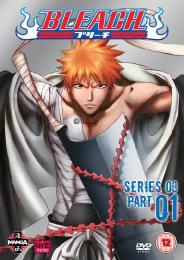
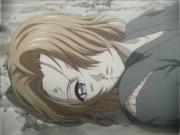
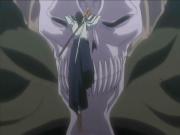
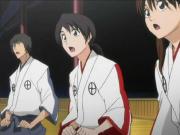
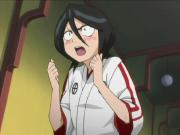
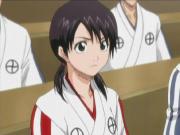
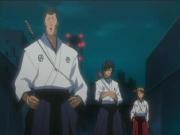
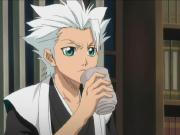
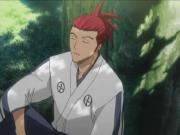
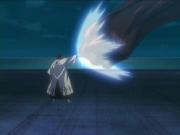
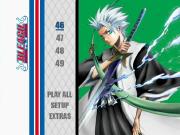
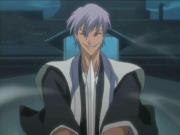
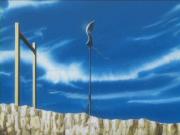
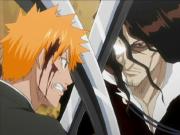
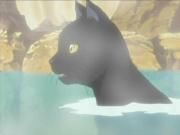
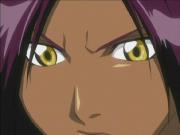
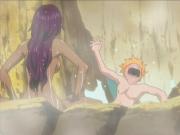
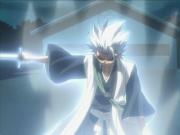
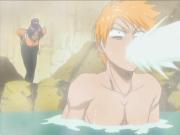
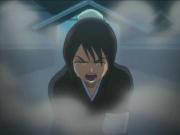
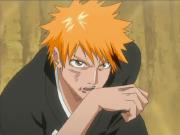
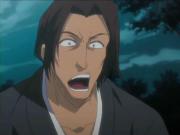
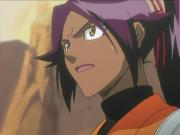
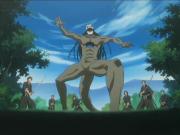
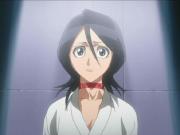
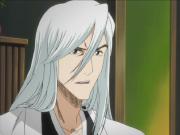
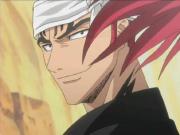

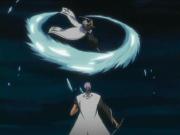












































Your Opinions and Comments
Be the first to post a comment!